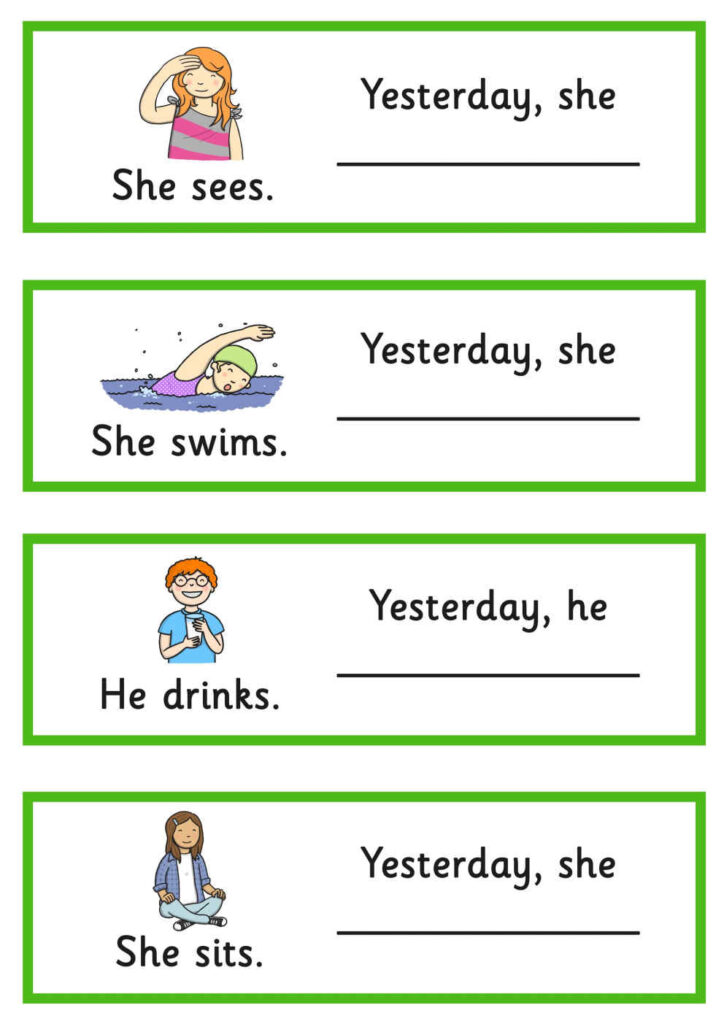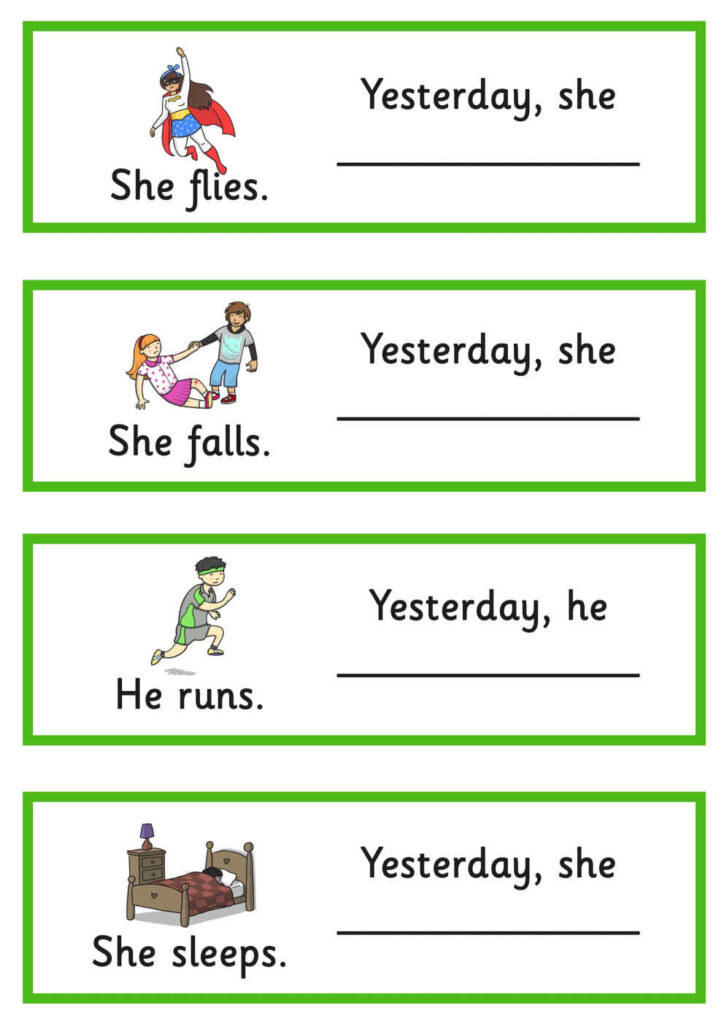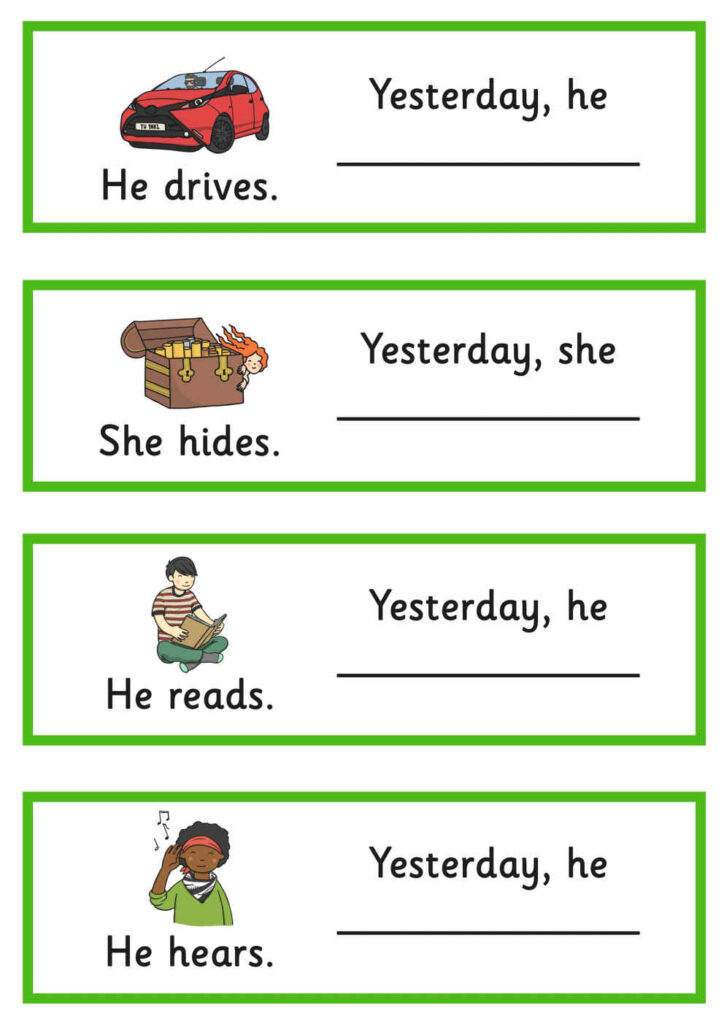
Simple Past Irregular Verbs Worksheets
Just when you think you’ve mastered English grammar and all of the tenses, you come across irregular verbs.
The majority of English words follow a set of rules: now I use, yesterday I used.
Irregular verbs are difficult to master because there isn’t a single rule that applies to them. They don’t stick to the script. All you have to do now is memorize them.
But don’t be concerned! This tutorial will assist you in learning to detect English irregular verbs in a variety of situations.
How to Spot an Irregular Verb in English
It’s interesting to study about the history of irregular verbs, but it doesn’t help you learn them. To learn about irregular verbs, you must first grasp what they are.
The pattern for regular verbs is always the same. They have the same appearance as in the past and are simple to manufacture. Adding the letters -ed to the end of a word is usually all that is required!
Some instances are as follows:
I work, I worked, I had worked.
He laughs, he laughed, he had laughed.
Irregular verbs, on the other hand, defy this pattern. They’re easy to spot because they’re so different in the past tense.
Here are several examples:
I write, I wrote, I had written.
He builds, he built, he had built.
In the simple past tense and past participle form, an English verb is irregular if it does not finish in -ed. Are you unsure what they are? Here’s a quick way to think about it:
Any action that occurred before the present time is described in the simple past tense.
Regular verb: I worked for 40 hours last week.
Irregular verb: I spoke to my best friend yesterday.

Other English tenses with an auxiliary (or “helping”) verb utilize the past participle. The past perfect tense, for example, describes an action that occurred and concluded in the past by combining the auxiliary verb “had” with the past participle of your main verb.
Regular verb: I had worked for the company for only 6 months when I decided to leave.
Irregular verb: I had spoken at over 50 schools by the time I turned 30.
Irregular English Verbs: How Common Are They?
Because many of the most used verbs are irregular, it’s crucial to memorize them!
Some words that you use in speech on a regular basis are irregular. It’s possible that you’ll need to inform someone that you’ve already started working on the new project at work. You may also say to a pal, “I saw you in the park yesterday, but I didn’t say anything because I thought you were busy.” Notice how the verbs saw (past tense of see) and thought (past tense of think) are both irregular?
When you consider that the English language has over a million words, the list of irregular verbs isn’t particularly long. If you don’t know where to begin, learning them can be difficult.
Now it’s time to learn them! Fortunately, there are certain tricks that can help you learn irregular verbs faster.
The 7 Most Effective Techniques for Recalling Irregular English Verbs

- Compile a list of common irregular verbs.
Irregular verbs defy all norms, which is why they’re so difficult to memorize. Some irregular verbs, on the other hand, follow a similar pattern. Instead of learning the verbs in alphabetical order, divide them into groups that are related.
The order in which you organize the verbs is up to you, but here are some suggestions:
Verbs that remain the same in the present, past and past participle.
Examples: cost and set.
Verbs that are the same in the past forms, but not the present.
Examples: breed, bred and shoot, shot.
Verbs that end in -en in the past participle.
Examples: speak, spoken and wake, woken.
- Familiarize yourself with all new vocabulary and its tense forms.
By mastering irregular verbs from the start, you can make life easier for yourself in the future. When you learn a new verb, be sure to understand its tenses as well.
Don’t only learn that stealing involves taking something from someone without their permission. You should also know that its past participle is stolen and its simple past tense is stole.

- Start by memorizing the ten most common irregular verbs.
The usage of irregular verbs is not universal. You’ll very certainly never hear the word broadcast, and you’ll almost certainly only hear the word abide in the context of the phrase law-abiding citizen (that is, someone who follows the law).
Focus on the most regularly used words first, rather than going through the list in alphabetical order.
Begin with the following words (listed as present, past, and past participle):
Say, said, said
Go, went, gone
Come, came, come
Know, knew, known
Get, got, gotten
Give, gave, given
Become, became, become
Find, found, found
Think, thought, thought
See, saw, seen
That’s true, all of these insignificant yet crucial verbs are irregular! To utilize them in normal discourse, you’ll need to grasp their irregular forms.

- Make memorizing a game.
You might not have any issue learning irregular verbs with flashcards, but if you do, why not make it a game?
There are a few games on the internet that might help you memorize the verbs quickly and easily. The British Council offers a quiz-style game, the MacMillan Dictionary offers a verb wheel, and Quia offers a Jeopardy-style game.
With index cards, you can even create your own game: On separate index cards, write the verb and its past or past participle (or both). Then, in front of you, turn all of the cards over.
You may now play a game of memory. Overturn one card, then another. Leave the cards face up if they match. Turn them over and try again if they don’t work.
- Take notes in sentences.
When the words are part of a statement or a phrase, it may be simpler to remember them. You’ll learn words by arranging them into sentences, and you’ll learn how to use them appropriately as well.
You can use lines like this to learn the word see: “I see the bee, I see the snow, but I’ve never seen a bee in the snow!”
Make your sentences as strange as possible; the more bizarre they are, the easier they will be to remember. You can utilize rhymes, keep your lines brief, or make a whole story out of it.

6. Post listings where they can be seen.
Sometimes the best course of action is to simply memorize. Divide the verbs into groups of 5 to 10 words to make it easy for you (you can group them alphabetically, by how common they are or by the groups we suggested earlier in this article).
Make a list of the verbs and post them in places where you’ll encounter them throughout the day. Tape the list to the back of your coffee maker, the table, and even the bathroom wall! Just a few minutes a day spent looking at the list will help you recall them.
Move on to the following group of verbs once you’re certain that you’ve remembered the entire list.
7. Request that others correct you.
Nothing beats practice, but it’s also necessary to practice appropriately! When communicating with an English speaker, ask them to correct you if you make a grammatical error. This is useful for all of your English speaking, not just irregular verbs.
Make sure you can accept their correction without becoming frustrated or angry. Remember, they’re on your side!
That list of irregular verbs doesn’t seem so terrifying after reading all of these tips, does it?






